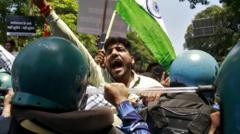In response to a deadly attack in Kashmir that left 26 tourists dead, Pakistan has halted visa services to Indian nationals and expelled Indian diplomats. This escalation follows India's assertions that the attack was conducted by militants linked to Pakistan, while Islamabad denies involvement. The situation reflects deep-rooted animosities and raises concerns of further conflict between the two nations.
Tensions Escalate as Pakistan Suspends Visas for Indians Following Deadly Kashmir Attack

Tensions Escalate as Pakistan Suspends Visas for Indians Following Deadly Kashmir Attack
The recent Kashmir attack on tourists has triggered a series of retaliatory measures between Pakistan and India, highlighting ongoing tensions in the disputed region.
Kashmir has become the epicenter of renewed tensions between India and Pakistan after a militant attack in the Indian-administered territory resulted in the deaths of 26 tourists, prompting a swift and severe response from Islamabad. The Pakistani government has announced an immediate suspension of all visa services for Indian nationals under a special exemption scheme, alongside measures including the expulsion of Indian diplomats and closure of its airspace to flights from India.
Indian authorities reported that three of the four gunmen responsible for the assault, which occurred in Pahalgam, a popular tourist destination, are linked to the militant group Lashkar-e-Taiba (LeT). Despite these claims, the Pakistani government has categorically denied any involvement, calling the allegations baseless and dismissing them as lacking credible evidence.
In a reaction filled with indignation, Indian Prime Minister Narendra Modi vowed to track down and punish the terrorists and their supporters, stating that "India's spirit will never be broken by terrorism." The Indian government has also implemented several retaliatory diplomatic measures, including the immediate closure of the Attari-Wagah border and the cancellation of visa services for Pakistani nationals.
The escalating situation has prompted Pakistan to reject India's suspension of the Indus Water Treaty, emphasizing that any attempt to disrupt water flows will be deemed an "Act of War." Pakistani airspace has been restricted to Indian-operated airlines, and the country has significantly reduced the size of the Indian diplomatic contingent in Islamabad.
As authorities detained around 1,500 individuals for questioning related to the attack, life in Kashmir slowly resumed with businesses and schools reopening following a temporary shutdown in the aftermath of the violence. However, communities across the region mourn the widespread loss, with emotional farewells for victims reported from their home states in India.
Reports indicate that the attack has led to an increase in aggression toward Kashmiri individuals in other parts of India, with students facing harassment and threats. Regional political leaders decry the attack as barbaric, emphasizing the need for solidarity amid rising tensions.
As Pakistan and India navigate this fraught moment, both countries are reminded of the fragile nature of peace in the region and the potential for further conflict.
Indian authorities reported that three of the four gunmen responsible for the assault, which occurred in Pahalgam, a popular tourist destination, are linked to the militant group Lashkar-e-Taiba (LeT). Despite these claims, the Pakistani government has categorically denied any involvement, calling the allegations baseless and dismissing them as lacking credible evidence.
In a reaction filled with indignation, Indian Prime Minister Narendra Modi vowed to track down and punish the terrorists and their supporters, stating that "India's spirit will never be broken by terrorism." The Indian government has also implemented several retaliatory diplomatic measures, including the immediate closure of the Attari-Wagah border and the cancellation of visa services for Pakistani nationals.
The escalating situation has prompted Pakistan to reject India's suspension of the Indus Water Treaty, emphasizing that any attempt to disrupt water flows will be deemed an "Act of War." Pakistani airspace has been restricted to Indian-operated airlines, and the country has significantly reduced the size of the Indian diplomatic contingent in Islamabad.
As authorities detained around 1,500 individuals for questioning related to the attack, life in Kashmir slowly resumed with businesses and schools reopening following a temporary shutdown in the aftermath of the violence. However, communities across the region mourn the widespread loss, with emotional farewells for victims reported from their home states in India.
Reports indicate that the attack has led to an increase in aggression toward Kashmiri individuals in other parts of India, with students facing harassment and threats. Regional political leaders decry the attack as barbaric, emphasizing the need for solidarity amid rising tensions.
As Pakistan and India navigate this fraught moment, both countries are reminded of the fragile nature of peace in the region and the potential for further conflict.






















